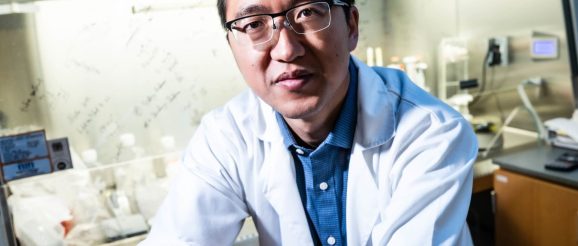Rice’s new Synthesis X Center has winning formula for cancer innovation

by Jade Boyd Special to Rice News To find better drugs and materials for diagnosing and destroying cancer, Rice University’s new Synthesis X Center (SynthX) is building on a proven formula: Regularly bring together people who are experts at treating cancer with those who are experts at creating precisely formulated molecules, and let chemistry take its course. “At Rice, we are strong on the fundamental side of research in organic chemistry, chemical biology, bioengineering and nanomaterials,” said Rice chemist and SynthX Director Han Xiao. “Starting at the laboratory bench, we can synthesize therapeutic molecules and proteins with atom-level precision, offering immense potential for real-world applications at the bedside. That’s really unique in the Texas Medical Center (TMC). No other organization has that expertise.” But to solve clinical problems, Rice’s experts need to work closely with their TMC counterparts. “Together, they can find the benchside solutions that solve the bedside problems,” Xiao said. “But the clinicians and fundamental researchers don’t have a lot of time to talk and to exchange ideas, so SynthX wants to serve as the bridge and help make these connections.” Launched last month, SynthX is fostering research collaborations to spur drug discovery and make precision adjustments to drug properties and translate fundamental research discoveries into clinical applications. “I am confident that the SynthX Center will be a great resource for both students and faculty who seek to translate discoveries from fundamental chemical research into medical applications that improve people’s lives,” said Thomas Killian, dean of the Wiess School of Natural Sciences. Launched via a collaboration with Baylor College of Medicine’s Dan L Duncan Comprehensive Cancer Center, SynthX is the culmination of a grassroots effort that began seven years ago when Xiao’s Rice research group began collaborating with Baylor researchers at the Duncan Cancer Center. At least a half-dozen similar collaborations between Rice and Baylor research groups followed. And as the connections grew, Xiao and others began organizing regular meetings where collaborators could share progress and more groups could find partners. SynthX’s monthly meetings now draw about 100 participants, Xiao said, including principal investigators (PIs), postdocs and graduate students from Rice, Baylor and other TMC organizations as well as a number of Rice undergraduates. “It’s a super-heavy research focus, but we try to have PIs discuss their career paths and career development before their talk, because not every student wants to be a PhD,” Xiao said. “Some of them want to be M.D.s or M.D.-PhDs. This is a great opportunity for our students to look at different people from different career paths.” The university’s recognition and support of SynthX will allow it to expand. A 2023 retreat, which allowed PIs to get together in small groups to share unpublished findings, will become an annual event. The center also expects to organize and host a national conference each year. Planning for the first, titled “Synthetic Innovations Towards a Cure for Cancer,” is underway for the fall. Xiao said SynthX is also preparing to award its first seed grants in April. The merit-based grants will be awarded to teams with representatives from both Baylor and Rice and will be structured with incentives that allow researchers to access additional funding if they jointly apply for federal funding after their first year. Xiao said SynthX is focused exclusively on improving cancer outcomes, but the scope of activity is broad, and the center will address several overarching challenges. “One is prevention and detection,” he said. “Can you develop early detection in a noninvasive way, for example? Another is finding different, more effective ways to treat metastasis. Removing long-term side effects of cancer treatment is a challenge area, and so is immunotherapy. Those are not working for everybody, and response rates can be 20% or even lower. Why is that the case? Can you make immunotherapies that are more applicable to the general population?” He said another area of focus is the discovery of new ways to use artificial intelligence to speed drug discovery, development and testing. Xiao said another of SynthX’s long-term goals is cutting the length of time it takes for innovative treatments to reach patients. For example, he said the center has already had preliminary discussions with leaders of the Rice Biotech Launch Pad, a Houston-based accelerator Rice established in 2023 to expedite the translation of Rice health and medical technology discoveries into cures. “I think this will be a great opportunity to work together and see how we can launch more multi-institution startup companies,” he said. “I think that’s really intriguing to different people, and it is a long-term goal.” — Jade Boyd is associate director of communications in Rice’s Wiess School of Natural Sciences.
